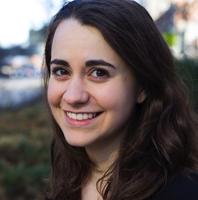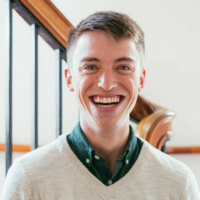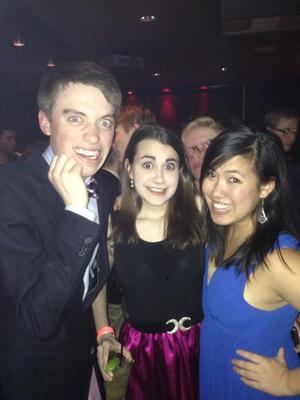 Three recent alumni talk about musical theater, composing and the ways Harvard facilitated their paths to Broadway. They’ll be on campus Oct. 18.
Three recent alumni talk about musical theater, composing and the ways Harvard facilitated their paths to Broadway. They’ll be on campus Oct. 18.
By Sasha Barish ‘20
Harvard is full of musical theater – this semester alone the Harvard-Radcliffe Dramatic Club is putting on Mamma Mia!, Fun Home, West Side Story, H.M.S. Pinafore, and two new student-written musicals – and I’m always impressed by the dedication and creative skill of students musical theater-makers. Musical theater is such a complex, collaborative, large-scale art form; I can see from the vast amounts of time that my classmates put into their work that working on the music for a theatrical show is not only a musical task but also an intellectual one, which involves creating the emotional color of every step in a story (not to mention that it’s a challenge in organization and collaboration with dozens of colleagues). That’s part of why I’m looking forward to the upcoming panel discussion with recent Harvard College alumni Isaac Alter '16, Cynthia Meng '15 and Madeline Smith '14. Since graduating, all three have established careers as musicians, conductors and composers in the world of Broadway, working on highly acclaimed musicals such as Dear Evan Hansen, Waitress and Hadestown.
At the event, which takes place 4 p.m. October 18 in Farkas Hall, the three will talk about the musical aspects of musical theater. They will also be visiting rehearsals that night for shows in process. In advance of their conversation, I asked ask them a bit about their career trajectories. Here are some of their answers.

What impact did your experience at Harvard, including academics or other non-musical activities, have on your creative work and interests?
Cynthia Meng: I studied Computer Science in school because it required 10 credits to graduate, so I figured I would be able to put off making a decision about my life until later while still making a “practical” decision (and yes, I did enjoy CS50 a great deal). Learning to think programmatically and algorithmically is important no matter what you do, in my opinion, but I found it particularly applicable to my work now because so much of what we do now involves music technology and programming to some extent – using Ableton, QLab, MainStage, Finale, Logic, ProTools, whatever – the list goes on. All those programs can be enhanced by writing your own scripts, which I’ve taken advantage of sometimes.
Isaac Alter: I had literally never done theater before I got to Harvard. I had always been a musician and always enjoyed theater but never considered the possibility of a career related to either. So I essentially owe my entire theater career to the undergraduate extracurricular scene at Harvard. I learned most of what I now do professionally just making theater with my college friends, which is kind of crazy if you think about it. My degree in stem cell biology isn’t really put to great use these days, but I loved biology, and I loved what I studied, and I loved working in Doug Melton’s lab and I wanted to stick it out and cap off my academic career with a degree in biology.

What was your path from Harvard College to a career on Broadway?
Madeline Smith: The summer after graduation, I got a grant from the music department to see operas in Western Europe. I felt like I was meant to take a stab at the freelance thing, but it’s scary, especially when some Harvard students spend their entire senior year with a job locked down. In September, I used all my savings to get an apartment in Manhattan without a single gig lined up. My first two jobs were assisting on week-long readings of new musicals I was connected to one composer through Larry O’Keefe, whom I knew from FAP, and to the other composer through a Facebook status that my blockmate screenshotted to me. Things snowballed from there. Even if a certain project never goes anywhere, the composer, director or producer might pull you into their next thing.
Meng: At Harvard I was pretty involved in music extracurriculars – in the latter half of my time there I really started to be more involved in the theater scene as a music director/composer via the Hasty Pudding and HRDC. That was really important for me in seeing that a career in theatre was actually a viable option in life. I moved to New York with a software engineering job at Pandora and ended up gigging a lot on the side during my time there and working a lot on the side in the theater scene. Ultimately after about three years full-time there, I decided I had enough going for me to make the leap and go freelance, and have been working as a freelance musician since then.

Alter: Lots of crazy luck and amazing opportunities! I decided to apply to the ART internship at the end of my junior year, and it happened to be the summer they were developing Waitress. So I interned on that show that summer, and at the end of the summer the music team requested I continue working on the show for the Broadway transfer. I created my class schedule such that I was only in class Monday through Wednesday, and then spent most of my senior spring (while writing a thesis) commuting from Boston to New York every Wednesday night and returning every Sunday night. It was insanity, but so fun and I graduated college with a Broadway credit under my belt already.
What draws you to musical theater as a genre?
Smith: I find the collaborative nature of it so humbling. It takes so many talents and skill sets to make a musical good, and not just artistic skill – administrative, producing, etc. And yet, when you see a really great musical, it impacts you with one cohesive magical blow. It’s almost impossible trace back your enjoyment to specific contributions. You liked the music? Wouldn’t have happened without dance arrangers, copyists and sound mixers. You liked the costumes? That wasn’t just the costume designer. There were dressers, wardrobe supervisors and drapers.
Meng: I don’t know that I specifically love theater itself more than any other form of performance. The skills I have happen to suit working in the theater, so that’s most of the work I end up doing.
Alter: I think what has always appealed to me so much about musical theater is its unique ability as an art form to tell stories in an incredibly dynamic and emotional way. I grew up listening to country music, and I think that also is unique as a genre in a similar way. Country music is known to most people as a bunch of dudes singing about their trucks and tractors, and of course there is some of that, but there’s this incredible tradition and legacy in country music, the power of what people call the “story song” and the capacity of a song to tell an incredibly emotional story in just a few minutes.

Do you have any advice for students with similar career interests?
Smith: When you grow up loving theater, there’s a tendency to pursue performing exclusively – perhaps because that’s the most visible aspect of theater-going. Take the time to process and analyze how your love for theater lines up with your natural skill set. When you go see a professional show, look through the endless job descriptions in the playbill. I think this is particularly important for women. When a young girl has a musical mind, she’s often encouraged to be a singer. When a young boy does, he’s encouraged to compose.
Alter: I try to use my own self-doubt in positive ways when I can. I knew the things that I didn’t think I was very good at, and so when I decided that I wanted to make a go of theater professionally, I spent much of my senior year trying to hone those particular skills as much as I could. Working on the things I perceive as weaknesses, rather than just continuing to convince myself I’m not good enough because of them, has been a huge motivating force for me throughout my career.